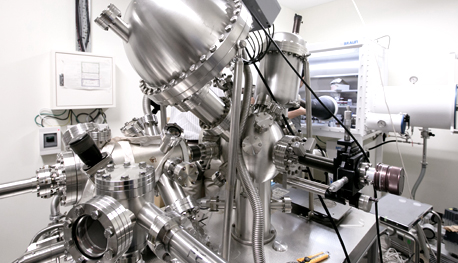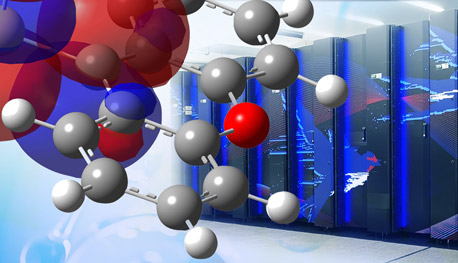Education
Materials Science and Engineering
Undergraduate MajorCurriculum
Specialized education built on a broad foundation — a solid footing for researchers and engineers in materials science
Students in their first year acquire knowledge in basic mathematics, physics, and chemistry, etc., in 200-level and 300-level courses. Following these courses, they are required to take quantum mechanics and thermodynamics courses, which teach the fundamental principles of materials physics and materials synthesis methods. Students will then broadly and systematically learn physics and chemistry in relation to different types of materials, deepen their understanding of the basic-level subjects, and acquire various techniques through experiment courses. The Independent Research Project is designed to help students develop practical skills for conducting research, promoting creativity, explaining processes and expressing ideas, and other essential abilities that are required of researchers and engineers.
-
1st Year
- 100-Level Courses
-
Students in their first year of undergraduate studies receive basic education that centers on Institute-wide compulsory courses regardless of their discipline. The 100-level courses are designed to teach common, basic skills that are required of science and technology students. The aim of these courses is to provide knowledge and cultivate the versatile intellect necessary for studying at the Institute.
-
2nd Year
3rd-Year- 200-Level and 300-Level Courses
-
Students who complete their 100-level courses advance to their undergraduate major. Courses at the 200- and 300-levels specific to the Materials Science and Engineering Undergraduate Major are taken in accordance with the curriculum.
-
- Basic Materials Science Courses
- Department-wide compulsory courses such as quantum mechanics and thermodynamics are offered, since they are the basis for understanding the properties of materials, underlying structures of materials, and material synthesis methods.
-
- Metals Focuses
- Students systematically study in specialized courses that are grouped into three categories —physical metallurgy, chemical metallurgy, and materials science — to deepen their knowledge of metallurgical engineering.
-
- Organic Materials Focuses
- In these courses, students focus on organic chemistry and physical chemistry, which are fundamentals of organic materials engineering. In addition, students acquire knowledge required to understand advanced scientific research.
-
- Inorganic Materials Focuses
- Students systematically learn structural chemistry, properties of matter, reaction chemistry, and process chemistry to advance to experiments or practical training.
-
- Experiment/Exercise Courses
- First, students are required to take Materials Science Laboratory for their department-wide basic experiment courses. They then proceed to more specialized experiment courses in metallurgical engineering, organic materials engineering, and inorganic materials engineering.
-
-
4th Year
- 200-Level and 300-Level Courses
-
At the final stage of the 300 level is the Independent Research Project (equivalent to the Undergraduate Thesis Research that was in place previously). The project is intended to serve as a capstone for students to consolidate and reinforce all of the skills acquired in their major. Furthermore, they may choose to enroll in the Advanced Independent Research Project. The purpose of this course is to enhance student interest in scientific and technological research that began with the Independent Research Project, as it provides the opportunity for them to actively engage in science- and technology-related activities.
* The timeline depicts a standard case in which students complete their bachelor's degree program in four years.
-
Entrance Examination
Students need to pass an entrance exam to advance from a bachelor's to a master's program. To advance from a master's to a doctoral program, students must pass an advancement assessment.
-
Graduate Majors
Master's Program
Doctoral Program- 400-Level, 500-Level, and 600-Level Courses
-
Students who complete the Materials Science and Engineering Undergraduate Major may continue to study the same discipline in more depth at the graduate major level. They may also advance to one of the following closely related interdisciplinary graduate majors: Energy Science and Informatics Graduate Major, Science and Technology for Health Care and Medicine Graduate Major, Nuclear Engineering Graduate Major or Materials and Information Sciences Doctoral Program.
-
- Department that offers this graduate major
-
- Materials Science and Engineering
-
- Departments that offer this graduate major
-
- Chemistry/
- Mechanical Engineering/
- Electrical and Electronic Engineering/
- Materials Science and Engineering/
- Chemical Science and Engineering/
- Computer Science/
- Transdisciplinary Science and Engineering
-
- Departments that offer this graduate major
-
- Departments that offer this graduate major
-
- Mechanical Engineering/
- Electrical and Electronic Engineering/
- Materials Science and Engineering/
- Chemical Science and Engineering/
- Transdisciplinary Science and Engineering
-
- Departments that offer this graduate major
-
- Physics/
- Chemistry/
- Electrical and Electronic Engineering/
- Materials Science and Engineering/
- Chemical Science and Engineering/
- Computer Science/
- Life Science and Technology/
- Transdisciplinary Science and Engineering
-





